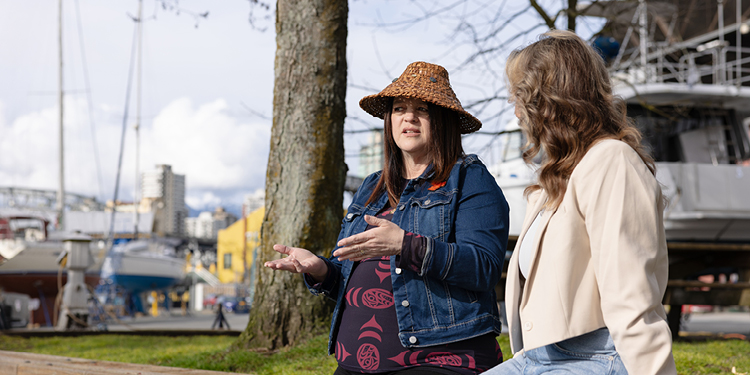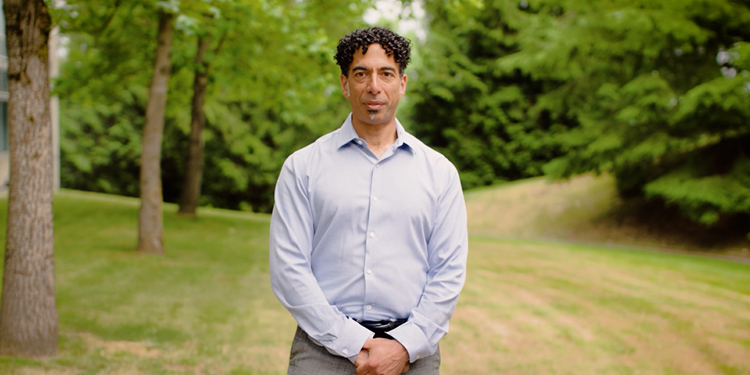How the rich heritage of Indigenous canoes is being shared
March 31, 2023
Canoes have been a symbol of Coast Salish culture since time immemorial, representing tradition, heritage and a connection to the land and waterways. Canoe building is a form of art with intricate designs and techniques passed down through families. War canoe racing has long provided an opportunity for communities to come together and celebrate their culture and heritage.
There is a thriving community of Coast Salish canoe building and war racing in the Lower Mainland, which is the traditional, unceded territory of the Coast Salish Peoples. Interest in the design and racing of canoes continues to flourish in large part due to the passionate people behind Canoe Cultures, an Indigenous-led non-profit organization dedicated to the art and culture of the canoe and the artists who create them.
We had a chance to speak to two of the driving forces behind Canoe Cultures and their legacy-building work–Master Carver Mike Billy, Snr., a seventh-generation canoe carver from the Sḵwx̱wú7mesh Úxwumixw (Squamish Nation) and Canoe Cultures Board Member, Caroline Phelps from both Nuu-Chah-Nulth; Stó꞉lō Territories and of Hawaiian descent. In addition to hosting exhibits and building demonstrations, they are passing down traditional canoe building techniques to the next generation and have re-introduced canoe racing to False Creek.
Seven generations of canoe building
Both Caroline and Mike emphasized how canoe building and racing have helped Indigenous communities maintain connections with each other, especially during the period that Indigenous People faced many restrictions on their freedom to gather.
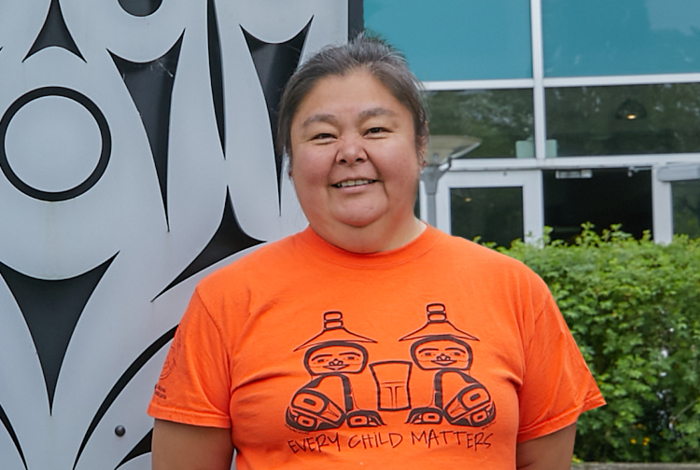
Caroline Phelps, Canoe Culture board member, is passionate about passing along cultural knowledge to youth through participation in canoe events.
“War race canoes are very important to Indigenous People, especially our coastal Coast Salish territories,” said Caroline. “It was one of the things that was not taken from Indigenous People–it survived during the time when Potlatch and Powwows were banned and we weren't allowed to practice our culture, so it survived through all that.”
Evolving with cultural experiences
Mike’s hereditary name is Lemxacha Siyam which means “canoe-builder”. He’s been around canoes his entire life and is now passing along those skills to his son Mike Billy Jr. He describes how both canoe building and racing continue to evolve.
My earliest memories are playing in a canoe, the same sort of thing with my sisters. And I was like, four, I guess, or three or whatever. It's just kind of what we do; it's what we are, basically. It's only natural.
Mike Billy Snr, a seventh-generation canoe carver
According to Mike, both racing and building have evolved, reflecting the experiences of Indigenous communities.
“When I started paddling in the 70s, we were sort of still in the residential era. It was kind of like Canadian hockey, there was a bit of bump and grind in it. It sort of changed in the 90s when our people started to heal, get help and get therapy and get different avenues of dealing with the problems that were cast upon them. This started to show in the races, I watched the whole transition. I see the young guys be respectful. It’s still bump and grind but now it's more like a sport.”
It was also in the 90s that people started to branch out. They got involved in opportunities throughout the world–from dragon boating in Japan to outrigging in the South Pacific and Hawaii. Racing provided opportunities to see the world and pass that on to the new generations of racers.
From dugouts to strip canoes
Mike explained that canoe building also evolved substantially over this period. While traditional dugout canoes remain important for artistic expression, racing canoes have transitioned to strip canoes using composite materials like fiberglass making them lighter, faster and more affordable to build.
“We evolve as quickly as we can. When I started building these were dugouts–a single one would weigh about 80 or 100 pounds. And then I think I was in my teens or in grade 10 and I saw the woodworking teacher make a strip canoe, so I took the design, and I went home and I made the first strip double. And then shortly after that everybody started making strip canoes.”
Passing down skills to a new generation
Both Mike and Carolyn are now passing along the knowledge to the next generation and sharing their passion with people from all cultures. Caroline promotes the traditional Tribal Canoe Journeys where she supports youth from every culture by guiding them in using cultural protocol in a good way and keeping traditions alive. Mike works with school districts, canoe clubs and other organizations to share both traditional and modern-day canoe building techniques. He estimates that they have now worked with over 80 students.
“It's pretty cool where canoe building has gone and that it's been handed down through the generations for thousands of years, and it's still handed down today. I think that's really important. It’s been quite a transition from what my dad taught us. I'm just amazed at my son's capabilities,” said Mike.
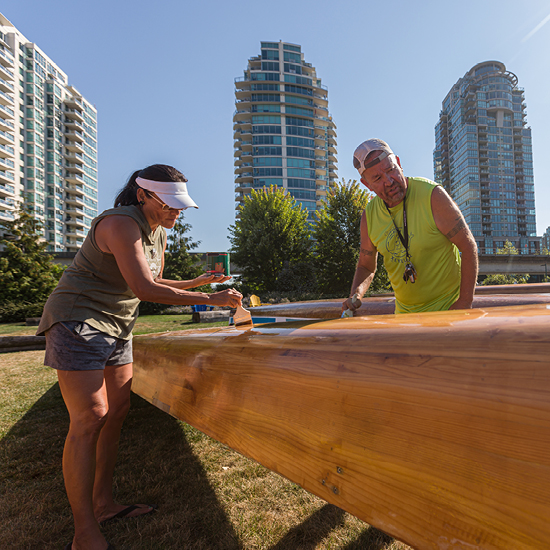
Michelle Point (L) and Walter Point (R), race participants, putting a finishing coat on an 11-person strip canoe at the inaugural 2022 Four Fires Festival, the first canoe race in False Creek in 100 years.
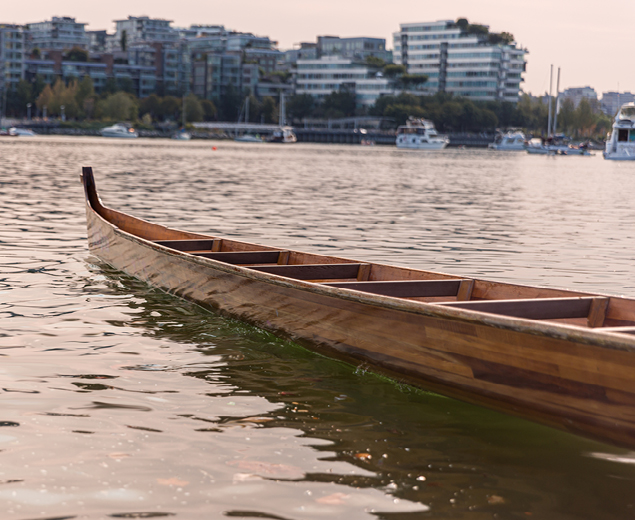
Michelle Point (L) and Walter Point (R), race participants, putting a finishing coat on an 11-person strip canoe at the inaugural 2022 Four Fires Festival, the first canoe race in False Creek in 100 years.
New opportunities for canoe racing
Mike, Carolyn and their team at Canoe Culture achieved a significant milestone last year–hosting the inaugural Four Fires Festival in Vancouver which brought back canoe racing to False Creek for the first time in 100 years. The festival was the culmination of a 20-event race schedule over the summer that attracted dozens of teams and hundreds of competitors from coastal communities on the west coast.
“False Creek doesn't have a Nation, so we brought it back,” said Mike.
In addition to racing, Four Fires celebrated and shared the rich cultural heritage and traditions of the Coast Salish communities of the region by including an artisan market, traditional music, storytelling and other cultural activities. After over a year of planning, it meant a lot to the organizers, participants and spectators to see it come together.
“It was so emotional to see the canoes coming in and the canoes being put in the water–having that many teams come for the Fires Festival, that have answered the call. We thank everybody for making history by bringing the canoe races back to False Creek,” said Carolyn.
Opportunities to get involved
We’re proud to support Canoe Cultures and are grateful for the opportunities our employees have had to take part in races including in Musqueam, Tsleil-Waututh Nation and Cowichan Tribes. The steadfast efforts of Carolyn, Mike and others to organize events, create learning opportunities for youth and share their passion for canoes has led to many enthusiasts within FortisBC and beyond.
There are War Canoe Races virtually every weekend from mid-May to mid-September. Each event is an opportunity to experience the region’s unique and rich Indigenous culture, as well as better appreciate our shared connection with the waterways that surround us. They’re also a lot of fun–we encourage others to experience a war canoe race firsthand or check out one of the many Canoe Culture exhibits that take place throughout the year.
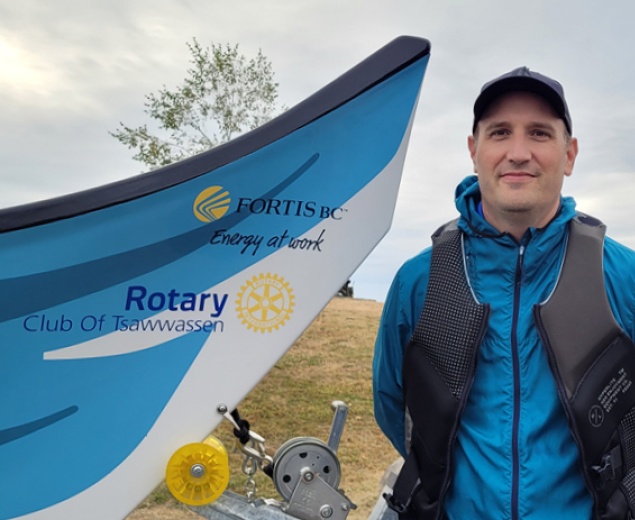
Scott Neufeld, project manager, FortisBC, took part in a traditional “waking up the canoe” ceremony September 2022, as the Delta School District launched Wave Warrior, its new canoe co-created by artists from the Tsawwassen First Nation and Musqueam.
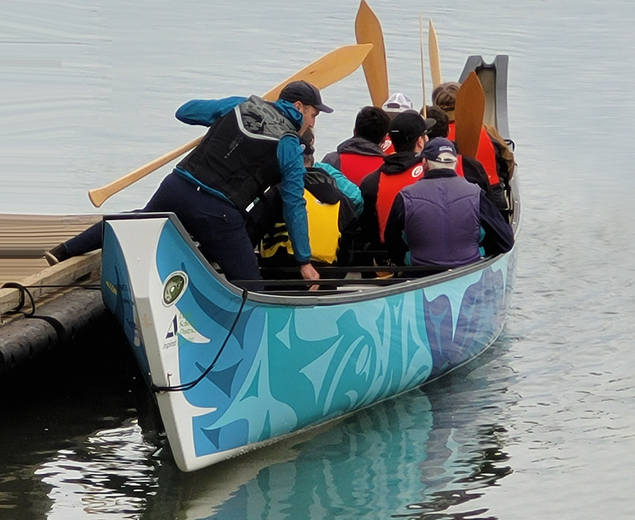
Scott Neufeld, project manager, FortisBC, took part in a traditional “waking up the canoe” ceremony September 2022, as the Delta School District launched Wave Warrior, its new canoe co-created by artists from the Tsawwassen First Nation and Musqueam.

